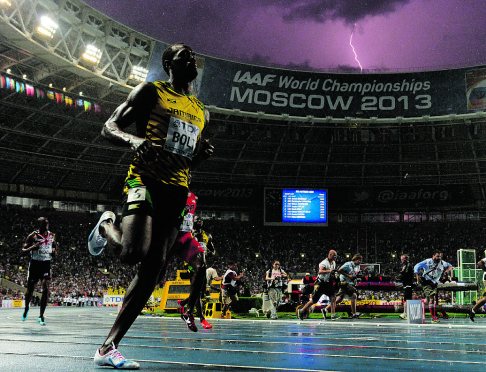Jamaica has long been the sprint capital of the world, but as this Sports Illustrated article demonstrates (H/T Ollie Williams), the country’s anti-doping efforts in recent years have been pathetic. In the five months before last year’s Olympic Games in London, guess how many out-of-competition tests were conducted?
One. That’s it. A single measly test. Usain Bolt may be largely superhuman, but given the reputation of both his sport and his country, there will always be questions asked about his performance. As this week’s Sports Talk column discusses, Bolt has the ability to continue the sport’s growth almost singlehandedly, but if he ever falls foul of those testers, track and field could have a quick and very painful death.

An incredible thing happened about a week ago, when Usain Bolt regained his 100 meters World Championship title. Olivier Morin, a photographer for AFP, captured a shot of the man nicknamed the Lightning Bolt with an actual lightning bolt clearly visible in the background above the stadium roof.
It was, in some ways, the defining picture of Bolt’s remarkable career, one in which he has now won eight World Championship gold medals, six Olympic titles, and set eight world records.
Bolt is undoubtedly the greatest track athlete of his generation. Other athletes have scaled great heights in Moscow, but none captivates the worldwide press as much as the fastest man in the world, which is why he is scrutinized more than any other athlete.
When it was revealed last month that Tyson Gay and Asafa Powell – together responsible for half of all the 100 meters times ever run under 9.8 seconds – both used performance-enhancing drugs, or PEDs, it was impossible not to wonder if Bolt had done as well.
With baseball’s PED scandal blown wide open, cycling’s ongoing battle to convince the skeptics that it has turned a new leaf, and track and field athletes all testing positive for banned substances in recent months, Bolt’s legacy is more important than ever. He might be single-handedly saving the sport right now, but if he is ever found to have crossed the line, he would single-handedly destroy it.
In other sports, such as American football, PED use is almost acceptable. Players may test positive and receive suspensions, but none of them are vilified. Football fans clearly don’t care.
But athletics fans do. If you’re watching to see who will be faster, higher, stronger, as the Olympic motto goes, you want to see these heights attained through a combination of natural talent and hard work. But the ethics of sports and sportsmanship cannot be ignored, and if you cross that line, you become a cheat.
There have been growing calls to legalize all substances in sports, with the argument being made that this is the only way the playing field can truly be level, while the associated health risks are downplayed. We are a long, long way from this becoming a reality, but we’re closer to it than ever before. In the meantime, though, today’s heroes have to live by a certain set of rules. I, for one, hope that Usain Bolt does so.
Bolt plans to run in Rio at the 2016 Olympics, but it’s doubtful if he could continue much longer after that. Chinese sprinting is struggling to replace Liu Xiang right now, but expect to see some of the youngsters come through ahead of the next World Championships in Beijing in 2015.


I wrote an article with a similar sentiment here: (http://morethanagamesports.com/2013/08/20/last-man-standing/) At this stage, Athletics entire reputation and credibility as a sport rests on Bolt’s shoulders.